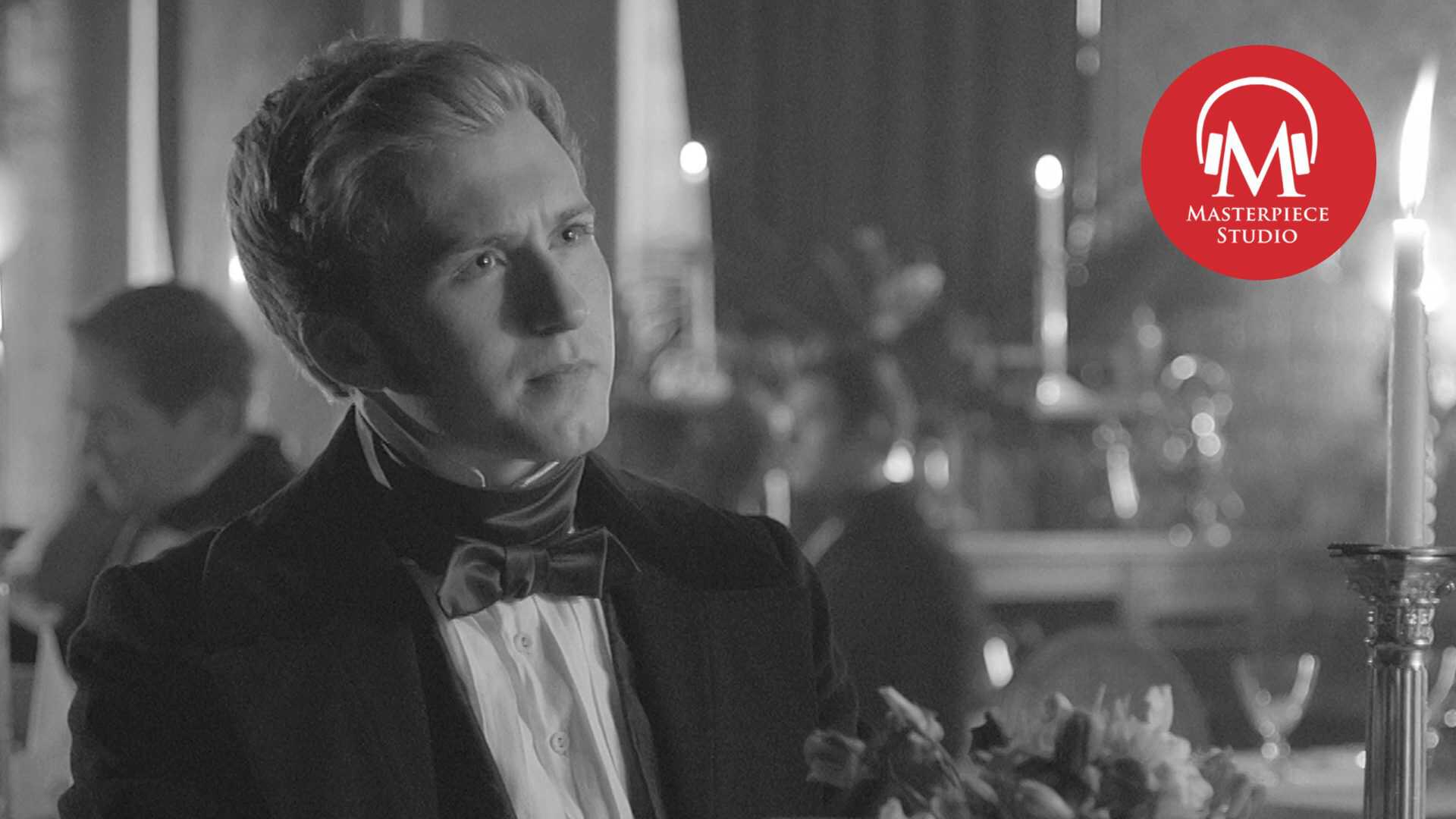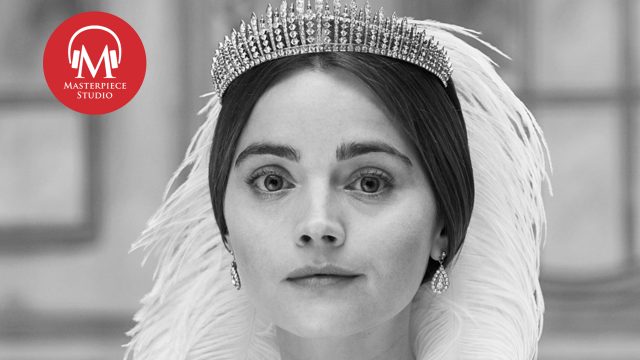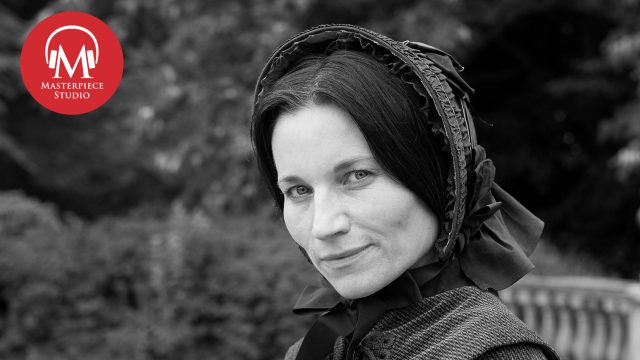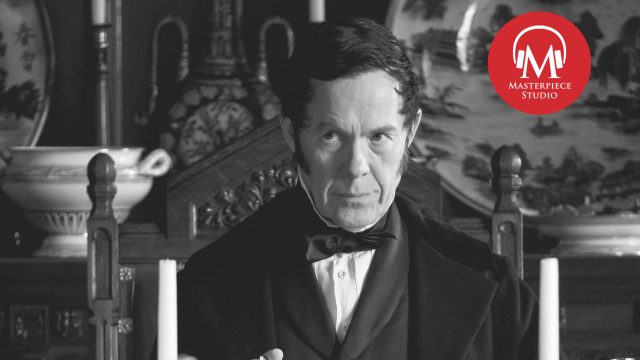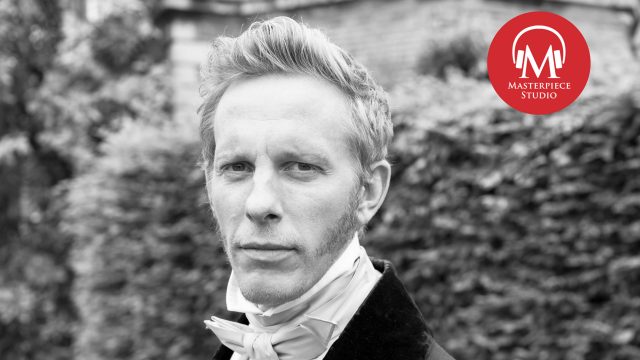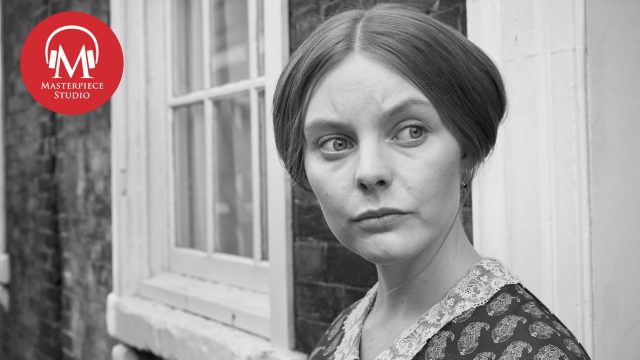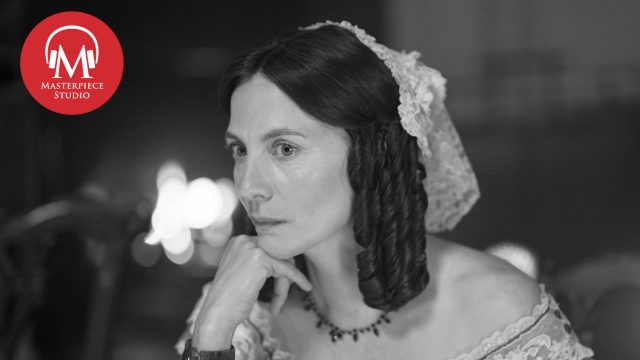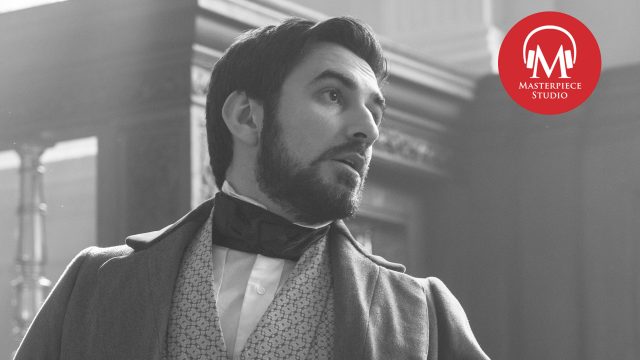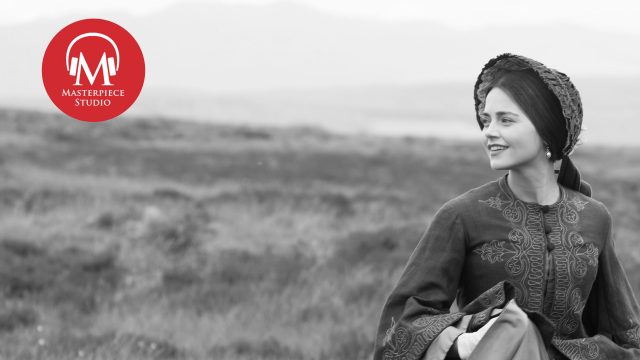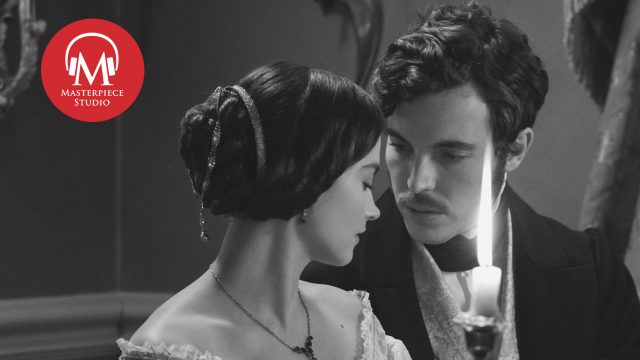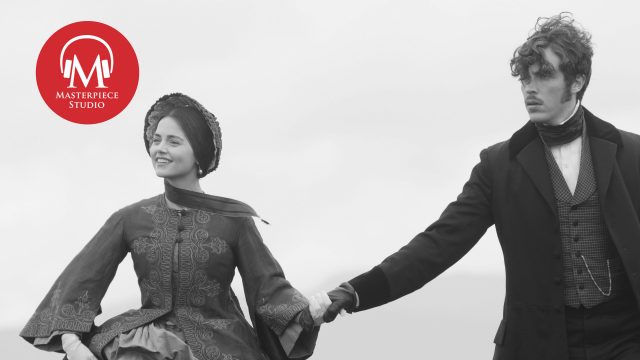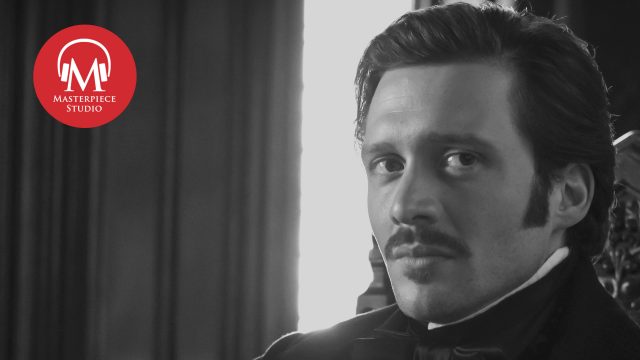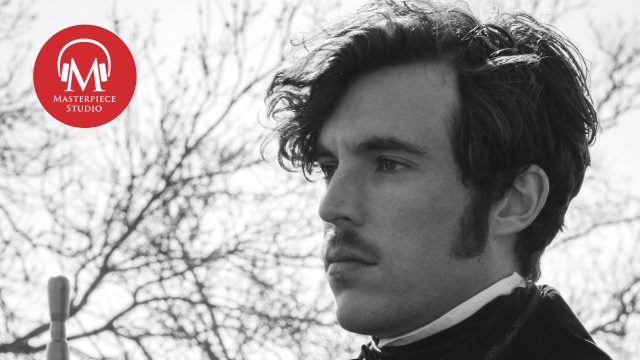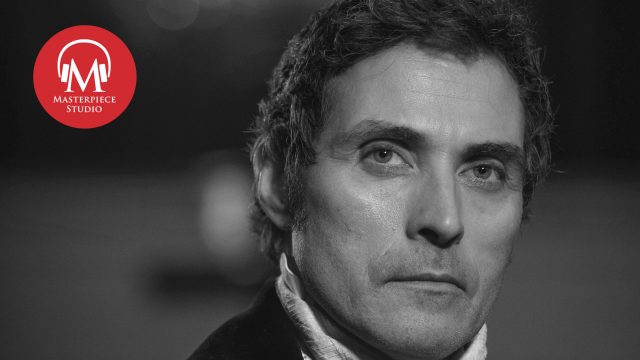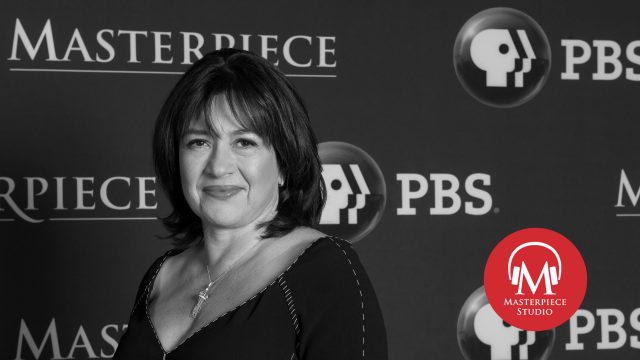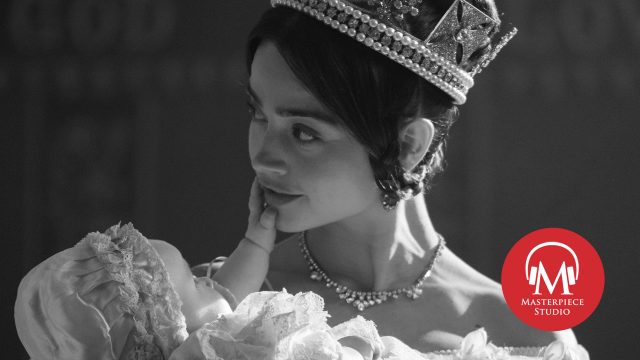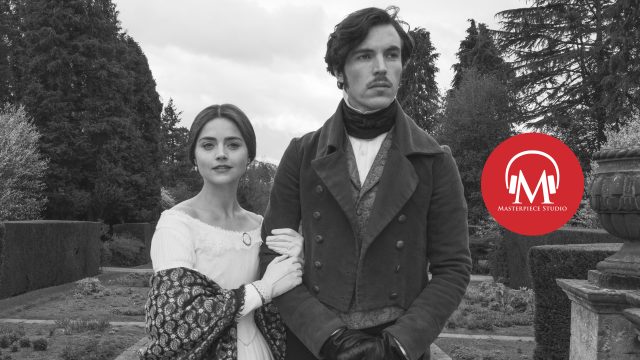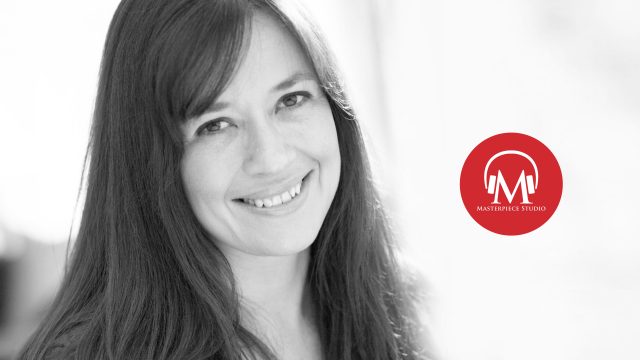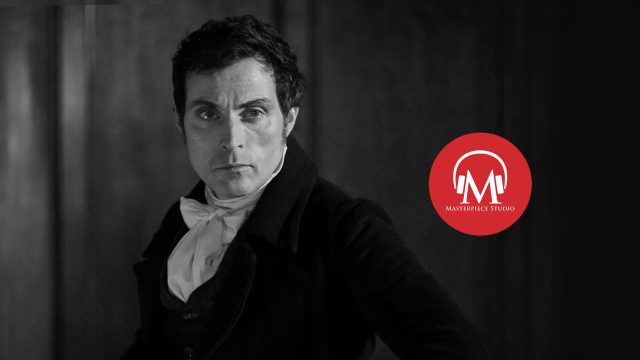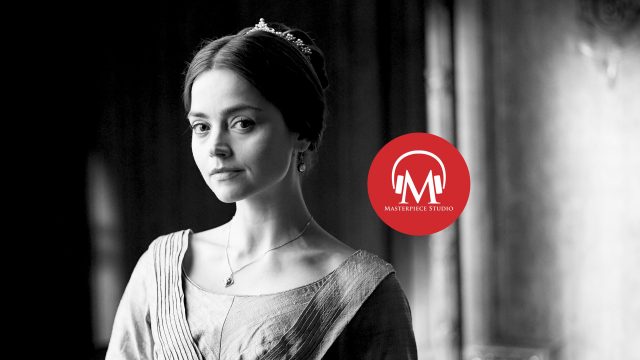Jace Lacob: I’m Jace Lacob, and you’re listening to MASTERPIECE Studio.
Lord Alfred Paget is a background bonvivant in Queen Victoria’s royal household, providing aid and humorous assurances to the Queen and her many courtiers on their travels across the United Kingdom and Europe.
CLIP
Lord Alfred: I wonder if the Prime Minister knows about the Queen’s Caledonian adventure?
Drummond: Do you think I should tell him?
Lord Alfred: I think that Scotland is a long way from home.
Jace: He’s always there with a hip flask, a wan smile or a piece of advice, but now he’s moving more into the spotlight. Rather unexpectedly, he’s grown close to Edward Drummond, private secretary to Prime Minister Sir Robert Peel. The two young men share an clandestine moment of intimacy in the Scottish Highlands — and make plans for a future rendezvous.
CLIP
Lord Alfred: I understand I have no right to determine your future but I think it would be a shame if you never tasted the oysters at Ciro’s. I will be there this evening. Yours, Alfred.
But Drummond has been shot and killed in a tragic case of Parliamentary intrigue and mistaken identity, and Alfred’s unconventional — and fictionalized — romance is at an end. It’s an unexpected plot twist that’s pushed Alfred into the surprisingly consoling bosom of the Duchess of Buccleuch.
CLIP
Jordan Waller: I think that there’s a sort of brusque Scottish pragmatism there that rings rings true in a way. And I saw it as…sort of tacitly maternal, or grandmaternal.
Jace: Actor Jordan Waller, who plays Lord Alfred Paget, joined us to discuss the doomed romance between Alfred and Drummond, the quietly-knowing Wilhelmina Coke, and the upcoming season finale of Victoria.
Jace: This week we are joined by Victoria star Jordan Waller, welcome.
Jordan: Thanks for having me.
Jace: In one of his first appearances in season one, Lord Alfred Paget is described in the script as, quote, ‘blond, handsome and tender-looking.’ What were your initial impressions of the character?
Jordan: Lord Alfred struck me as an incredibly diplomatic presence throughout the court of Queen Victoria. Historically speaking he was her equiry, he was a general in the army and he was also her favorite dance partner. So he was her best friend more or less, and she she wrote an awful lot about him in her diaries. He was even rumoured to be one of her suitors before she met the inevitable Prince Albert. Uh, so my impressions of him were that he he did have a certain delicacy about him and I tried to capture that a lot and in the posture in the way that sort of delicate matter in which he addresses people, in which he handles situations which was a really interesting feat when you’re approaching a historical character.
Jace: Now that you’ve played Lord Alfred for two seasons how do you see the character having grown or changed in that time?
Jace: Well I think what was really bold about Daisy Goodwin’s script in season two was obviously this inclusion of the romance, if you can call it that, with Drummond, Edward Drummond, played by Leo Suter, who’s a wonderful man in real life. And I think it was so bold because in those times, obviously, there was no such thing as gay. Gay didn’t really exist as a term. And without that linguistic basis, it is very very difficult to conceive of what that meant. So what these characters are going through and what Lord Alfred in particular is experiencing is a intensity of emotion that isn’t based within language. So both of these characters are feeling something that they can’t quite describe and what was so beautiful about portraying Alfred was trying to capture those ways in which we feel against the way we think. So it was a really interesting challenge to try to navigate that. And also an incredibly bold move to make Victoria’s best friend into her gay best friend, I thought, by Daisy Goodwin.
Jace: Now it is the 1840s homosexuality is still a crime in England punishable by death until 1861. How did that knowledge of true risk complicate your portrayal of the attraction between these two men?
Jordan: It injects the whole thing with a certain amount of jeopardy but there’s also a freedom to play around with that. Historically speaking what could be pointed out is that it wasn’t really until the Oscar Wilde case that the concept of man on man homosexuality — because of course Queen Victoria’s famously alleged to have said that lesbians don’t exist. And the jury’s still out, I suppose but before that particular case, which made the matter so public, men would hold hands in the street, you’d see police officers linking arms. So while there is obviously this real jeopardy at the idea that they could be imprisoned, they could I don’t know, potentially be killed maybe for the way that they feel towards one another. There’s also certain room to explore how they feel, through looks, and through subtle touches. No one would have ever basically thought that they were gay so they can get away with a certain amount of, for example, when we jump into the river, we can, you know, we can dunk each other, and and enjoy each other’s ripping pectoral muscles as much as we want until the cows come home really. So yeah I mean there’s there’s some freedom in it and it injects a little bit of jeopardy.
Jace: Their attraction does, as you say, play out largely in looks across crowded rooms which is a sort of Victorian, or period trope. That attraction slowly simmers between the two for much of the second season. What was it like working with Leo Suter, who plays Drummond?
Jordan: Leo is a very, a very nice man and you know, he’s an attractive bloke which is really nice, and he’s a good actor. We both never really kissed men before, and we were a bit nervous when it finally came down to it on screen and I dunno, you know it was literally just like any other kiss, it was great. I mean obviously I taught him a few moves as you might expect. It was a little bit like kissing the backside of a cat to start with, so he did ease into it and so did I. And I think it created a really beautiful moment that actually is the only moment — because I find it so excruciating to watch myself back as every good actor does. And it was the only moment that I could actually bear to watch and really move me emotionally because I was really engaged with that particular scene. It was really beautiful to see you know but you know it’s great we got you. Call me by your name. God’s own country we’ve got this gay kiss in Victoria I think it’s really amazing that we’ve got so many brilliant LGBT portrayals out there at the moment. So it’s really gratifying to see a good representation out there, especially in the period drama context, so good on Daisy Goodman for doing it.
Jace: I mean, Speaking of that kiss. If you read Twitter that was sort of the kiss heard ‘round the world, it seems. In terms of matching that level of expectation, how tricky of a scene was that to shoot?
Jordan: I think we we were nervous only insofar as we were aware that there could be a certain amount of grumbling say on Twitter because it’s not historically accurate, because historically speaking, the characters weren’t necessarily gay, but that is to completely miss the point of what a drama is. And also as to what the truth is the truth is not fact, very different things and this drama is truthful insofar as gay did exist in some form and it explores that, and the fact is who’s to say, yes, if Lord Alfred Paget historically speaking how you know 13 children with a wife, but so did Oscar Wilde. Who’s not to say, that you know that he that he was gay or straight or anything at all? So I think that was our only apprehension was that the kiss would somehow be grumbled at as a historical inaccuracy, and we were absolutely thrilled that it wasn’t taken in that way whatsoever. When we counted because we paid quite close attention to Twitter when it came out which is always a terrible idea. To be honest with you with any bit of performance, but we did with that particular moment for all of the reasons I just stated and we counted like one or two you know kind of old grumpy men in the middle of England who took issue with you know a gay agenda being pushed or something like that. But you know, it was great and it’s so humbling. I’m so pleased everyone loved it so much. It was really great, and I got some amazing messages and now I was I was really happy for Twitter that time a bit scared of it normally I’m not on it you see because I find it a bit daunting but that was really amazing. Highlight of the of the whole season two for me and Leo, I think.
Jace: Now did you and Leo know going into the season that it would be a short term affair for your characters as Drummond would be killed off by the end of the season?
Jordan: I was told that Drummond eventually would die. And I suspected that it would be at the end of the season. What was particularly interesting about the way that our relationship developed was that it was written up more and more as it went along because Leo and I, worked on our chemistry, and they could obviously tell that there was something there and we really and we started to work really well together and the better that we worked together the more space they wanted to give that story, which is really nice for both of us. And we were gratified that it got the airtime that it did really in the end.
Jace: Now the clinch between Alfred and Drummond — Wilhemina catches them in this moment. How much does she know and how much given the era she lives in does she understand about what she’s witnessed?
Jordan: I mean obviously she has a certain naivety and the way that she approaches Drummond’s loss and Alfred’s mourning of him is incredibly sensitively. And she shows some wonderful, almost infantile intuition about the fact that these men, even though she doesn’t necessarily understanding that there was a sexual undercurrent to what they were feeling, they had this deep, deep deep bond and her biblical citations I think perfectly captures that and Daisy showing the way that that’s how she can figure the intensity of the relationship via the literature that she’s read. So I think that’s a really beautiful moment. I think it’s lovely to see.
Jace: At the dinner at Ciro’s, Alford tells Drummond to reconsider breaking off his engagement as quote, ‘a successful politician must have a wife.’ Does Alfred apply that rubric to himself as well?
CLIP
Drummond: I’ve decided to break off the engagement.
Alfred: Why she seems like a perfectly admirable wife for a man with prospects.
Drummond: I think you of all people must understand why it cannot be.
Jordan: The way that Leo and I imagined it was that this potentially isn’t Alfred’s first tryst of this nature, shall we say. Alfred seems to be slightly more seasoned in matters of the heart. And I imagine that he may have experienced a little flutters or perhaps the odd dalliance here and there before Drummond, but nothing quite as important or significant to him as Drummond, I must assure the fans. Therefore he approaches the situation with a certain level of aristocratic pragmatism. And he understands that this love is forbidden and there’s no way of realizing it and his way his way of caring for Drummond is by sacrificing what he feels and realizing that they know they can’t be married and they can’t have kids because that’s just not what happened at the time. And it’s a real tragedy. And you know I’m so happy that things things are different now to be totally honest with you. And I hope everyone else is.
Jordan: Now he in that same scene. He calls his case with Drummond quote ‘an indiscretion’ and says that he can’t allow him to throw away his career in this way. I mean, does Alfred truly believe that it is an indiscretion, or is just sort of sacrificing this for Drummond?
Jordan: No way. There’s no way. He doesn’t believe that is an indiscretion. Of course Alfred has the intensity of meaning but having been through this before as I’ve prefigured, I think Alfred is making the perspicacious and sage decision to effectively quash any feelings that Drummond might have towards him, so he’s trivializing it in order to tame the wild passions of a slightly more mature love, that we might put it that way.
Jace: One of the great surprises this season on Victoria is that the Duchess of Buccleuch ends up being far more worldly than we give her credit for. Did it shock you to learn that the Duchess not only knows about Alfred’s feelings for Drummond, but doesn’t seem to care in the least?
Jordan: It’s really nice how about Duchess character, somebody who who’s sort of seen it all, you know, they’ve been through everything and it’s so you know flatly portrayed by by Diana Rigg and I think it’s an interesting choice and I didn’t quite read it the same way as you, that she didn’t care, it’s that she again she was almost taking Alfred’s role that Alfred took with Drummond, so where Alfred said ‘Come on now, we can’t possibly entertain the idea that we’re going to have a couple of dogs and live in the west coast and have a civil partnership’ or whatever, she’s saying, ‘Come on now you’ve got to I know what happened. But you have to be pragmatic about this. His wife is going to be there. She’s gonna be the main mourner. And you have to respect that. you are living in the age in which you are living.’ And I think that there’s a sort of brisk Scottish pragmatism there that rings true in a way. And I saw it as sort of tacitly maternal or grandmaternal, to be more accurate to Diana’s age.
Jace: Now there’s a fantastic vertigo like effect in the scene where Buccleuch has Alfred accompany her to the Amber Drawing Room
Jordan: Love that.
Jace: Where she gives him the letter about Drummond’s death. What was it like acting opposite Dame Diana Rigg here in this very emotional scene?
CLIP
Duchess: Take a deep breath. Now, another one. Here, have some of this. I may be old, but I’m not blind. I know what he meant to you. Now, I suggest you go to your room and compose yourself. And remember, at the funeral, the chief mourners will be his mother and his fiancee.
Jordan: She is a force unto herself and it is an honor to be in the same room with her while she’s still here. She is Dame Diana Rigg and it was a really good scene. And I was really pleased with how it turned out.
Jace: Now Alfred’s sorrow feels really palpable here. There’s a strong sense of keening, even though he holds back at the funeral. What did you draw upon to help you portray that sense of devastation that he felt?
Jordan: Well unfortunately I really I wish I couldn’t draw upon this but my one of my mothers died last year. And I very much drew upon the sadness that I felt at that funeral, because that was the closest experience I’ve had, and it’s something fortunate to the performance, perhaps, but less fortunate to my own life that I could I could easily draw upon. And that level of inexplicable pain, which you kind of can’t show, you have to just know what it’s like.
Jace: Before this next question, a brief word from our sponsors…
Masterpiece Studio is brought to you by Viking. Explore the world in comfort, by river and sea. Learn more at vikingcruises.com.
Jace: Just how broken is Alfred by Drummonds death, and is there any chance of future happiness?
Jordan: Well I won’t spoil anything for you, but I will say that whenever you lose anybody that’s important to you, it takes a hell of a long time to recover, but there is always light at the end of the tunnel, and I’ll leave it at that.
Jordan: I mean given the mounting closeness between Alfred and Wilhelmina Coke, what can you tease about what lies ahead for these two?
Jordan: Wilhelmina is a very sensitive and loving woman. That’s probably all I want to say.
Jace: He does share this very tender friendship with Wilhelmina, one that’s largely based on a mutual love of piano and books. What does Wilhelmina offer Alfred?
Jordan: I think a deep, deep level of understanding and a friendship that is based on intuition rather than just shared interests.
Jace: I love the fact that it is Alfred who rather gallantly comes to Wilhelmina’s rescue earlier this season after she has her heart broken by Ernest. I mean for her what do you think the attraction is with Alfred?
Jordan: Well I mean you know with Alfred. Who wouldn’t, if you know what I mean. I think it is this this shared experience that they’ve had together. I mean she was also, you know, he was also significant to her. And when you go through that intense emotion with somebody, you share something quite deep and you show them a part of vulnerability that sort of transcends the normal humdrum of daily mundane existence.
Jace: I love Alfred and Wilhelmina’s scenes together. How would you describe working with Bebe Cave, who plays Wilhelmina’s?
Jordan: Bebe is just brilliant. She’s about 12 years old. She’s the most talented actor I’ve ever met. She’s a genius. I mean, she’s so clever, it makes me angry and she’s just completely mad and very funny and totally psychopathic. I just think she’s wonderful.
Jace: There’s one episode left to Victoria this season and while we don’t want spoilers, what can viewers expect from this final episode?
Jordan: They can expect two big hunks of meat, and one of those appears at the end which is a baron of beef, and the other one is at the beginning because I take off my shirt and that is reason enough to tune in. There’s a lot of snow. There’s Christmas trees suspended from the ceiling. There are presents, there are laughing children and there is at least one proposal.
Jace: How heavily does the spirit of Drummond hover over the proceedings?
Jordan: Alfred would never ever forget Drummond, and that is a certainty no matter what the future holds. He will always exist alongside his friend, in some sense.
Jace: So it’s a Christmas episode, but not a Christmas Carol.
Jordan: Aww. That’s a lovely way of putting it. Yeah that’s great.
Jace: The real-life Lord Alfred Paget, as you mentioned, married Cecilia Windom, with whom he fathered a staggering 14 children. Does that knowledge inform how you portrayed the character at all, knowing that this might be where it’s headed?
Jordan: I think that I was aware that that my character, Like I said before, while deviating from historical facts, was more used to explore some historical truths about sort of what Victorian sexuality might be. I always had of course at the back of my mind because I did so much research about about Alfred Paget, all of this baggage and knowing what kind of chap he was, and I wanted to inform that no matter how much of licence was taken with history. Interestingly though I can give you another factor that could shine some light on to his situation and perhaps Daisy Goodwin’s choice which was that his great uncle maybe his uncle was the fifth Duke of Anglesey and he was a famous cross-dressing theatre impresario who would dress up as women and basically made a theatre in his back garden and invited people around to drag shows and he was then thenceforth sort of written out of the family history as a symbol of great shame. And I just think it’s interesting that in you know in the Pagets, there is a little bit of LGBT flair. So who’s to say, who’s to say that, you know, this romance couldn’t have happened in some form. We just don’t know. We don’t know anything about gay history because as Peter Ackroyd in his latest wonderful book “Queer City,” which is trying to re reinvigorate sort of gay narrative in the city of London, as he says, the only documentation we have oat all of homosexual activity is always negative, it’s always about the anti-sodomy laws, there’s none of the there’s none of the positive stuff and there’s no documentation of of how LGBT people shaped the world in which we live. So you kind of have to deviate slightly from history because the idea, the idea that there weren’t gays in the court of Queen Victoria is frankly ludicrous. I mean have you seen her dresses for Christ’s sake? Obviously obviously there were gay men everywhere.
Jace: True or false you were raised by three lesbian mothers.
Jordan: True, yes. I drew on the funeral of one of them, so unfortunately I only have two left, but it’s a place in some way are more fortunate than most people but in other ways I’m less fortunate because I think I have to go through this process three times, you know, my God. I don’t think I can handle it. But I was raised by by three women yes, I was conceived in Bristol is a small port town 200 miles west of London in 1992 by by my mother and her partner and then they they split up after I came along. Well a couple of years after I came along, and then my mum got together with somebody else and they all stayed as mothers in my life. And and that’s part of the reason I feel so honored to be portraying a sort of gay, or bisexual character on TV. I think it’s great and I want to see more of them.
Jace: Jordan Waller. Thank you so much.
Jordan: It’s such a pleasure, Jace, thank you for having me.
Jace: We’ll hear again from Victoria creator Daisy Goodwin on the Queen’s real-life feelings about same-sex relationships in her court, and more.
Jace: Why was there such resistance among Peel’s party to repealing the Corn Laws?
Daisy: The Tories most of them are landowning aristocrats who are making a fortune out of the Corn Laws so that’s why they don’t want to get rid of them. They are guaranteed a really high price for their wheat. And you know that is the sort of mainstay of their income. And so the aristocracy are very reluctant to give up a privilege that is keeping them in power basically. When the Corn Laws are repealed after that the English aristocracy begins to lose its grip on the country because the you know the glory days are over but it’s an incredibly unfair tax and you know Robert Peel really puts the good of his country before his party because he knows his party will split because of this and that they will reject it. But he also knows that repealing the Corn Laws is the only is the right thing to do. And I think the fact that he repeals the corn laws is one of the reasons why England unlike most of the other countries in Europe doesn’t have a revolution two years later in 1848.
Jace: In 1840 homosexuality was still punishable by death in England. And despite that how out in the open was homosexuality at the English court.
Daisy: Well I think I think attitudes towards sexuality were well, I think there were very different because I think there were no words for it. And I think that makes a huge difference. Obviously sodomy was a crime but I think the idea that some people were homosexual was just people didn’t think like that because the word homosexual didn’t really wasn’t I think invented until then until right at the end of the 19th century so because there wasn’t a word for it, I think it was much easier for men, you know who liked men, to like men and to marry women. There wasn’t that same sense of, you’ve got to choose one or the other. And I think, if you were an aristocrat and you were discreet ,you could pretty much do anything, to be honest. I know that there was quite a lot of homosexuality at Victoria’s court. For example Benson her Archbishop of Canterbury his wife. It turned out it was a lesbian and they had six children, all of whom were gay, and one of whom, Arthur Benson edited Victoria’s letters after her death so she was surrounded by gay men. She herself may not have been entirely aware of their predilections, but on the other hand I think she was quite worldly in her own way so she probably had a good idea. But it’s not something I think that she ever would have talked about. So I just thought it is very important though, for the show, for people to realize that people were gay in the 19th century just as they are gay now. But they live they live their lives in different ways and I think it was quite possible to be married with children and also have gay affairs but I mean, you didn’t come out then, because you know there was no word for that. You know most I should think a lot of gay men then were married because that was just the way life worked. I mean Victoria famously didn’t believe that lesbians could possibly exist, I found that so extraordinary. But you know but I think that’s because she was so, because she enjoyed heterosexual sex so much.
Jace: Fact or fiction: Drummond was killed stopping an assassin’s bullet meant for Sir Robert Peel.
Daisy: Yes that’s absolutely true, Drummond did die because he was killed by somebody who was trying to kill Robert Peel and got the wrong man simply again before the days of photographs. You know he’d been following someone who he thought was Peel and in fact it turned out to be Drummond and he shot him instead. The real Drummond was a bit older, was closer in age to Peel, than our Drummond, but he was shot by mistake, so. Very tragic.
Jace: Fact or fiction: Did Drummond or Alfred Paget know each other in real life.
Daisy: I’m afraid that’s all fiction, their relationship was completely fictional, and I’ve taken a terrible liberty. We also can’t prove that neither of them weren’t gay. I think it’s fair enough, really.
Jace: Earnest’s now symptom free of syphilis desperately wants to marry the widowed Harriet. In reality however he married someone else Princess Alexandrine before his father died, is that correct?
Daisy: That is correct yes. I think he married Alexandrine in 1842 but I decided to play around with Ernest’s marriage dates a little bit for dramatic purposes. I think it’s entirely possible he might get married in the later series. Who knows? But I wanted to play the story between him and Harriet because I thought it illustrated so many interesting themes about what men and women you know this very Victorian dilemma of you can’t marry the woman you love because you’ve been infected with this disease, and I thought that was such a terrible irony that I wanted to explore that.
Jace: Albert says they can no longer be three of us in this marriage. What was the dynamic in real life between Victoria Albert and Lehzen?
Daisy: Well I think it’s exactly as I portray, Albert was jealous of Lehzen because he felt that Lehzen was always trying to turn Victoria against him he felt that Lehzen was devoted to Victoria and that Lehzen wanted to come between him and Victoria and you know Lehzen was pretty much like a mother to Victoria and so he just resented having this woman around the whole time. I mean, when they first got married Lehzen slept in a room next door to their bedroom with an interconnecting door. So it was a very, very close relationship and then when Lehzen and started looking after their children and Albert didn’t think she was doing a very good job, and you know that whole episode with Vicki getting ill, that really happened. And Albert totally blamed Lehzen for that and made Victoria get rid of her. And made her choose between him and Lehzen and I’m afraid I took the liberty of using that three of us in a marriage line which obviously comes from a later royal.
Jace: It was apt.
Daisy: I thought it was very apt, yes.
Jace: How deeply was Victoria affected by the departure of Lehzen back to Hanover then?
Daisy: I think she pretended she almost like smoothed it over and but I think underneath she was terribly upset about it. I think she’s one of those people who didn’t like to feel guilty so she couldn’t really ever admit what she’d done, that she’d sort of banished this woman who been devoted to her all her life and you know it’s very sad you know Lehzen just spent the rest of her life devoted to Victoria there’s this awful story of Victoria going to visit Cobourg and her train goes through the station. Lehzen’s there standing on the platform just to get a chance to wave at Victoria as she goes by and Victoria doesn’t stop. I think she felt bereft, but she couldn’t really admit it. And she she couldn’t admit that she wronged this woman. So it was a very difficult position for her, I think. I think she slightly blames Albert for it, too.
Jace: We’re but one episode away from the second season finale of Victoria — and it’s beginning to look a lot like Christmas at Buckingham Palace. Christmas trees, candles, snow —
CLIP
Prince Albert: So. There will be a tree for each member of the family. And underneath them there will be an altar. And here, in the center of the room, we shall have the main tree, hanging from the ceiling.
Jace: Don’t miss our final Victoria episode of 2018, featuring lead actors Jenna Coleman and Tom Hughes and show creator Daisy Goodwin, appearing in your podcast feeds next Sunday.
The VICTORIA Sweepstakes is happening now through March 15, 2018! Enter daily at pbs.org/sweepstakes for a chance to win the Grand Prize, a Viking Ocean cruise for two adults in the British Isles. You may also win monthly prizes of VICTORIA merchandise. For Official Rules, including eligibility restrictions and prize limitations, visit pbs.org/sweepstakes. Void where prohibited.
MASTERPIECE Studio is hosted by me, Jace Lacob and produced by Nick Andersen. Elisheba Ittoop is our editor. Susanne Simpson is our executive producer. The executive producer of MASTERPIECE is Rebecca Eaton.
Sponsors for MASTERPIECE on PBS are Viking and The MASTERPIECE Trust.








